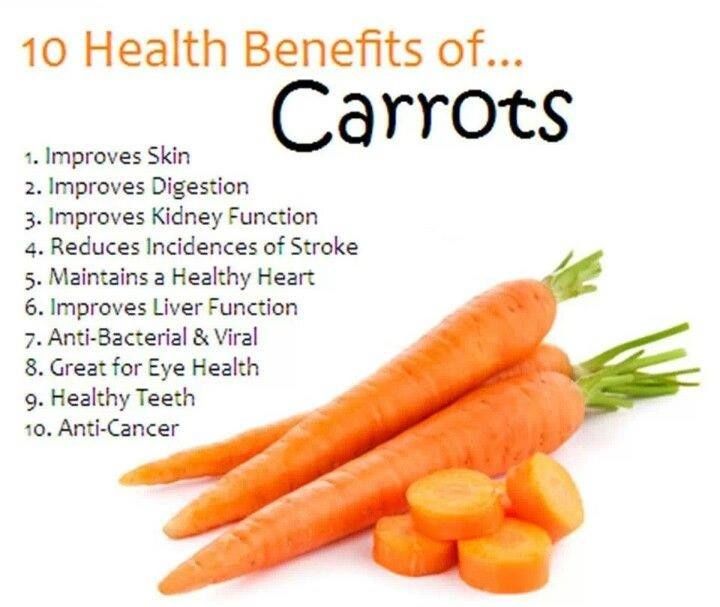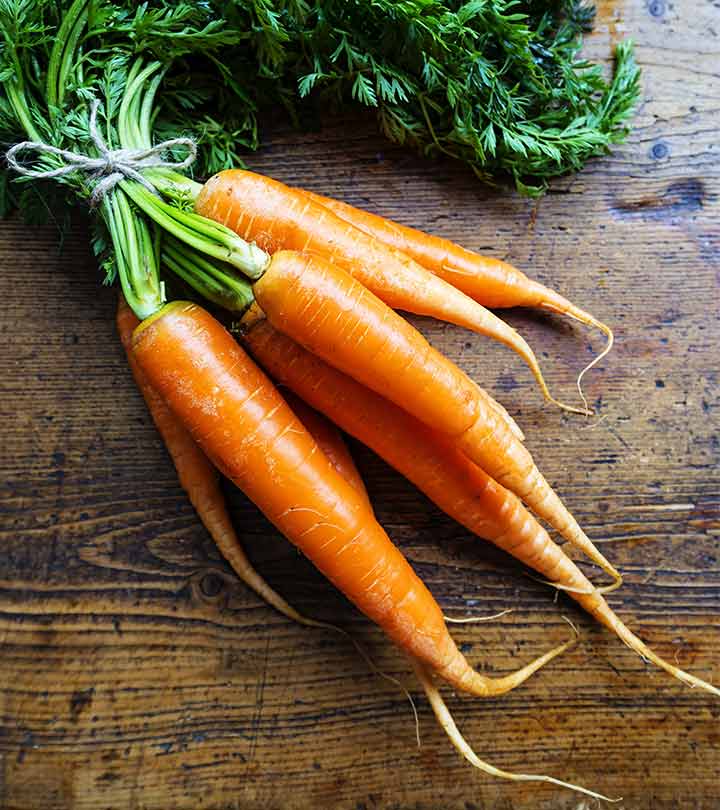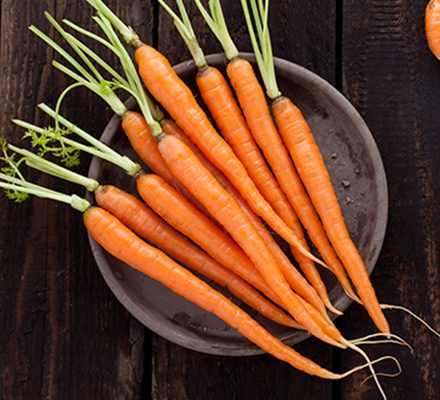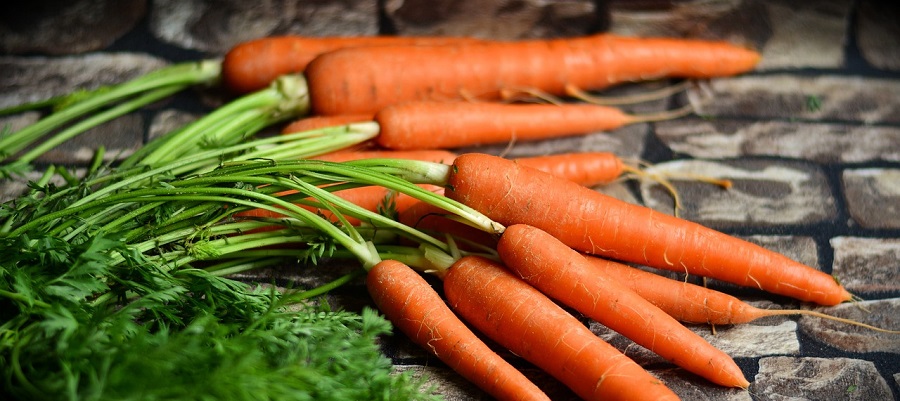Carrots are a staple vegetable that many of us enjoy, but did you know that they have a range of surprising health benefits? In this blog post, we'll answer some of the most common questions about the health benefits of carrots and why you should consider adding them to your diet.
What are some of the most surprising health benefits of eating carrots?

Some of the most surprising health benefits of eating carrots include:
-
Improved eyesight: Carrots are rich in beta-carotene, a nutrient that is converted into vitamin A in the body. Vitamin A is essential for healthy vision, and a lack of this nutrient can lead to night blindness and other eye problems.
-
Reduced risk of cancer: Carrots are packed with antioxidants that can help protect against cancer by neutralizing harmful free radicals in the body.
-
Lowered risk of heart disease: The fiber, potassium, and antioxidants in carrots can help reduce the risk of heart disease by promoting healthy blood pressure levels and reducing inflammation.
-
Improved digestion: The fiber in carrots can help promote healthy digestion by supporting the growth of beneficial gut bacteria and regulating bowel movements.
-
Stronger immune system: The high levels of vitamin A and antioxidants in carrots can help support a healthy immune system, protecting against illness and infection.
-
Healthier skin: Carrots contain antioxidants that can help protect against sun damage and other environmental stressors that can harm the skin.
-
Better brain function: The nutrients in carrots, including vitamin A and potassium, are essential for healthy brain function and can help improve memory and cognitive performance.
-
Increased energy levels: Carrots are a good source of natural sugars and fiber, which can help provide sustained energy throughout the day.
-
Improved bone health: The vitamin K and calcium in carrots can help promote healthy bones and reduce the risk of osteoporosis.
-
Reduced inflammation: The antioxidants in carrots can help reduce inflammation in the body, which is linked to a range of chronic health conditions.
How often should you eat carrots in order to see the health benefits?
Experts recommend aiming for at least one serving of carrots per day in order to see the full range of health benefits. A serving size of carrots is typically around one-half cup of chopped carrots, or one medium-sized carrot. However, consuming more than one serving of carrots per day is also beneficial and can provide additional health benefits. It's important to note that incorporating a variety of fruits and vegetables into your diet is also important for overall health, so don't rely solely on carrots for your daily nutrient intake.
Can eating carrots really improve your eyesight?
Yes, eating carrots can improve your eyesight. This is because carrots are a good source of beta-carotene, which is a precursor to vitamin A. Vitamin A is essential for healthy vision, and a deficiency in this nutrient can lead to night blindness and other eye problems.
When you eat carrots, the beta-carotene is converted into vitamin A in the liver and then transported to the retina of the eye. Once in the retina, vitamin A is used to form a pigment called rhodopsin, which is necessary for vision in low-light conditions. Additionally, the antioxidants in carrots can help protect the eye from damage caused by free radicals, which can lead to age-related eye diseases.
While eating carrots alone is not a guaranteed way to improve eyesight, incorporating them into a balanced diet that includes other fruits and vegetables can help support healthy vision and eye function. It's also important to note that maintaining a healthy lifestyle, including regular eye exams, avoiding smoking, and protecting your eyes from UV radiation, can help maintain good eye health over time.
Are there any downsides to eating too many carrots?

While carrots are a healthy and nutritious food, there can be downsides to eating too many carrots, especially in excess. Some potential downsides to consider include:
-
Carotenemia: Eating large amounts of carrots, or other foods high in beta-carotene, can cause a harmless condition called carotenemia. This condition is characterized by yellowing of the skin, especially on the palms of the hands and soles of the feet, and is caused by an excess of beta-carotene in the blood.
-
Digestive issues: Eating too many carrots, especially raw, can cause digestive issues such as bloating, gas, and diarrhea, due to their high fiber content.
-
Sugar intake: While carrots are a healthy vegetable, they do contain natural sugars, which can contribute to an overall higher sugar intake if consumed in large quantities.
-
Interaction with medications: Eating too many carrots, or consuming large amounts of carrot juice, can interact with certain medications, such as blood thinners, and can increase the risk of bleeding.
-
Allergies: Some individuals may be allergic to carrots, which can cause symptoms such as itching, swelling, and difficulty breathing.
It's important to consume carrots in moderation, along with a balanced diet that includes a variety of fruits and vegetables, to avoid these potential downsides. Additionally, if you have any concerns or underlying health conditions, it's best to consult with a healthcare professional to determine the appropriate amount of carrots to include in your diet.
What nutrients do carrots contain that make them so healthy?
Carrots are a great source of fiber, vitamin A, potassium, and antioxidants like beta-carotene and lutein. These nutrients can help protect against disease, promote healthy vision, and support overall health and wellbeing.
Can eating carrots help prevent certain types of cancer?
Some studies have suggested that a diet rich in carrots and other antioxidant-rich vegetables may help protect against certain types of cancer, including lung, breast, and colon cancer. While more research is needed to fully understand the relationship between carrots and cancer prevention, incorporating more carrots into your diet certainly can't hurt.
How can you incorporate more carrots into your diet?

There are plenty of delicious ways to add more carrots to your diet! You can snack on raw carrots with hummus or another dip, add grated carrots to salads or sandwiches, or roast them with other vegetables for a tasty side dish.
Are there any specific types of carrots that are better for you than others?
All types of carrots are healthy, but some varieties, like purple and black carrots, contain even higher levels of antioxidants than traditional orange carrots.
How do carrots compare to other vegetables in terms of health benefits?
While all vegetables are healthy, carrots are particularly nutrient-dense and offer a range of health benefits. Compared to other vegetables, carrots are particularly high in vitamin A and beta-carotene.
Is it better to eat carrots raw or cooked in order to maximize their health benefits?
Both raw and cooked carrots offer health benefits, but some studies suggest that cooking carrots can actually make their nutrients more available to the body. To maximize the health benefits of carrots, try incorporating both raw and cooked carrots into your diet.
In conclusion, adding more carrots to your diet is a simple and effective way to improve your overall health and wellbeing. Whether you snack on raw carrots or incorporate them into your favorite recipes, there are plenty of delicious ways to enjoy this versatile vegetable.


